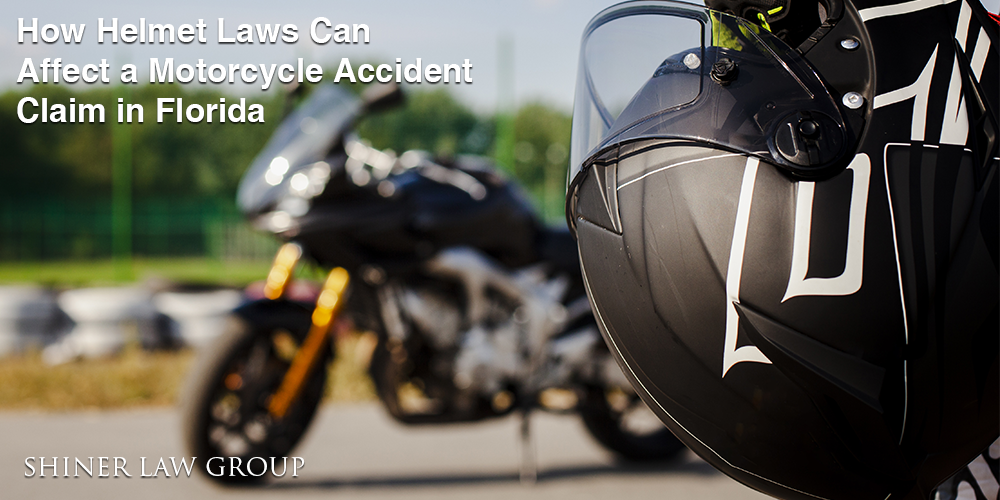A report from the Palm Beach County Medical Examiner claimed Marc’ Allan Derac was not wearing a helmet when he was ejected from the motorcycle he was driving.
The promising student-athlete on the football team at Atlantic High School in Florida had crashed into a turning SUV at Cresthaven Boulevard and Shady Pine Way in Greenacres earlier this year.
Although Palm Beach County Sheriffs arrived on the scene within two minutes of the accident, Durac was pronounced dead later that night.
In addition to not wearing a helmet, Durac, according to the report, was not licensed to drive a motorcycle. In Florida, operating a two- or three-wheel vehicle with an engine that is more than 50cc requires a motorcycle endorsement on a registered driver’s license.
However, since 2000 when the law was repealed in the state legislature, Florida does not require helmets to operate a motorcycle.

Florida motorcycle accident attorneys at Shiner Law Group have been representing injury victims throughout Palm Beach County and South Florida for many years.
Your life changes when you or a loved one has been injured in a motorcycle, scooter or bike accident.
Attorney David Shiner recommends that you get medical treatment within the first 14 days of your accident to ensure that your injuries are documented.
That does not mean everyone can hop in the saddle of a motorcycle without a helmet.
The Florida law does have some restrictions that require the rider to be:
- At least 21-years-old;
- Covered with at least $10,000 medical insurance
A similar law requires moped and motor-scooter operators under the age of 21 to also wear a helmet. In all cases, those caught breaking the law will receive a traffic ticket.
Law enforcement authorities attribute many deaths involving motorcycles, motor-scooters, and mopeds to riders and passengers who aren’t wearing helmets.
Helmets are said to be 37 percent effective in preventing motorcycle deaths – that’s about 1,859 lives in 2016 and about 67 percent effective in averting brain injuries, according to the National Highway Traffic Safety Administration.
Even so, the choice to wear a helmet or not is left up to drivers and their passengers – as long as they are aged 21 and older.
Because motorcycle riders are subject to all kinds of uncontrollable traffic and weather conditions that make operating a two-wheel vehicle more treacherous than an automobile or truck, putting on a helmet is not such a bad idea.
The numbers bear witness to the added dangers of going without a helmet. Consider:
- Florida continuously leads the nation in motorcycle crash deaths;
- Motorcycles account for 20 percent of all vehicle fatalities in Florida
In fairness, the high numbers could be attributed to Florida’s climate, which enables motorcycles to be operated year-round. But, wearing a helmet makes sense, especially when traveling at higher speeds. Put aside the argument that the government shouldn’t be involved in freedom of choice and think for a moment.
When a crash occurs, the body and head are moving at forward speeds. Higher speeds mean more force. A helmet is designed to absorb more intense blows to the head and extend the time of impact, thereby, reducing the potential for serious injury.
Despite the added safety assurances, helmets will not prevent all deaths and serious injuries. Still, many riders believe helmets will reduce the chance of an accident becoming much worse. Maybe because several national studies have confirmed an increase in traumatic brain injuries as well as fatalities in states where helmet laws have been repealed.
If they are not comfortable already, Floridians should get used to sharing their roadways alongside motorcycles. The number of motorcycles registered in Florida continues to go up each year. This amounts to a greater risk of motorcyclists being involved in head-on collisions or rear-ending crashes.
With these threats in mind, motorcyclists should know that they are not covered under the rules of no-fault insurance. In other words, for a motorcyclist to recoup compensation for damages in the event of an accident with personal injury, the only option is to file a lawsuit against the drivers of the vehicles at fault.
To their credit, motorcyclists are generally safety-conscious and follow the rules of the road. One study by the Florida Department of Transportation goes as far as to claim motorists driving cars and trucks are to blame for most accidents with motorcycles.
But, as long as motorcyclists are subject to potential injury or even death at the hands of distracted, careless or unsafe automobile and truck drivers, wearing a helmet will continue to provide the best protection – no matter what the law.
In the unfortunate event that you are involved in a motorcycle accident and have suffered personal injury, you will need an attorney who is skilled at applying Florida’s helmet laws to your advantage when attempting to recoup compensation for medical expenses, emotional suffering and lost wages.
Speak With A Motorcycle Accident Lawyer Today To discuss Your Accident Case
Shiner Law Group has a history of resolving motorcycle disputes in Florida. Florida injury attorney David Shiner and the experienced personal injury attorneys know the Palm Beach County court system and won’t be intimidated by the strong-arm tactics that insurance companies certainly will attempt to negate your claim. As a safe motorcyclist, you not only have a right to the road, but you warrant the same protections as all motorists.

